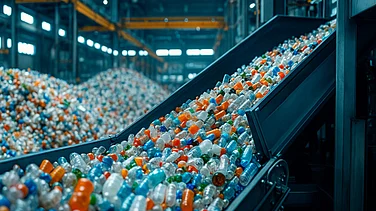As the world grapples with the escalating impacts of climate change, the search for sustainable energy solutions has never been more urgent. Traditional fossil fuels, with their high carbon emissions and environmental degradation, are increasingly viewed as unsustainable in the long term. In this context, biofuels emerge as a promising alternative, offering not only a reduction in greenhouse gas emissions but also the potential to revolutionise how we manage waste and produce energy. This article explores the critical role of bio-fuels in our quest for a greener future, emphasising the integration of waste management, organic fertilisers, and bio-fuel production as a holistic approach to sustainability.
The Urgent Need for Sustainable Energy Solutions
One of the most important issues of our time is climate change. The burning of fossil fuels, including coal, oil, and natural gas, has led to a significant increase in greenhouse gas emissions. In 2022, global CO2 emissions from fossil fuels and industry reached approximately 36.8 billion metric tonnes, contributing to rising global temperatures and environmental degradation. To combat these impacts, transitioning to sustainable energy sources is imperative. Renewable energy technologies, such as solar, wind, hydro, and geothermal power, are essential for reducing our carbon footprint and promoting environmental sustainability.
Biofuels as a Viable and Eco-Friendly Alternative
Bio-fuels, derived from biological materials like plant and animal waste, offer a renewable energy source that can significantly reduce greenhouse gas emissions. Unlike fossil fuels, which release stored carbon, biofuels are considered carbon-neutral. This is because the carbon dioxide emitted during their combustion is offset by the carbon dioxide absorbed by the plants used to produce them.
Bio-fuels come in various forms, including bioethanol, biodiesel, and biogas. In 2021, global bioethanol production was expected to reach approximately 111 billion litres, with major producers including the United States and Brazil. Bioethanol, made from crops such as corn and sugarcane, is used primarily in transportation. Biodiesel, derived from vegetable oils or animal fats, can replace traditional diesel fuels. Global biodiesel sales are projected to reach $42.5 billion in 2022 and grow at a compound annual growth rate (CAGR) of 10.8 percent from 2023 to 2032. Biogas, produced through the anaerobic digestion of organic waste, can be harnessed for electricity generation and heating.
The environmental benefits of biofuels are substantial. They reduce greenhouse gas emissions, lower air pollution, and decrease our dependence on fossil fuels. Additionally, biofuels can help stabilise energy prices by diversifying energy sources and reducing reliance on volatile oil markets. Despite these advantages, it is essential to consider the broader context of biofuel production to ensure that it contributes positively to sustainability goals.
Integration of Waste Management, Organic Fertilisers, and Biofuel Production
An important aspect of biofuels is their integration with other sustainable practices. Effective waste management and the production of organic fertilisers can complement biofuel production, addressing multiple environmental challenges simultaneously. Organic waste from households, agriculture, and industry often ends up in landfills, contributing to methane emissions—a potent greenhouse gas. By converting this waste into biofuels, we can reduce these emissions and generate valuable energy. The process involves anaerobic digestion to produce biogas, which serves as a renewable energy source.
Additionally, the by-products of biofuel production, such as digestate from anaerobic digestion, can be utilised as organic fertilisers. These fertilisers improve soil health and reduce reliance on synthetic chemicals, promoting more sustainable agricultural practices. Organic fertilisers can increase crop yields by up to 10-25 percent compared to conventional fertilisers, supporting agricultural productivity and sustainability. This circular approach to waste management and biofuel production creates a more efficient and environmentally friendly system, minimising waste and maximising resource use.
Synergies and Benefits of Combining Sustainable Practices
Combining biofuel production with waste management and organic farming practices creates synergies that enhance their individual benefits. Utilising waste materials for biofuel production not only reduces landfill use but also lowers greenhouse gas emissions. Concurrently, using organic fertilisers from biofuel production supports soil health and reduces the need for chemical fertilisers.
This integrated approach also promotes resource efficiency. By leveraging waste materials for biofuels and organic fertilisers, we reduce the need for raw materials and minimise environmental impacts. This strategy supports sustainability goals and enhances economic efficiency by lowering waste disposal and fertiliser production costs. In addition, the use of renewable bio-fuels can decrease the overall carbon footprint of energy systems as compared to fossil fuels.
Furthermore, this holistic approach benefits local economies. Bio-fuel production can create jobs in rural areas, where agricultural waste is generated. Organic farming improves crop yields and soil health, contributing to food security and sustainability. By fostering local solutions to global challenges, we build more resilient and self-sufficient communities.
As we confront the urgent need for sustainable energy solutions in the face of climate change, biofuels offer a promising path forward. Their ability to reduce greenhouse gas emissions, lower air pollution, and provide renewable energy makes them a key component of a greener future. By integrating bio-fuel production with waste management and organic fertilisers, we can address multiple environmental challenges and maximise benefits. This comprehensive approach not only supports sustainability goals but also enhances resource efficiency and promotes economic development. Embracing and expanding these integrated practices will be crucial in building a more sustainable, resilient world.
(Maninder Singh Nayyar is the founder of CEF Group.)




















